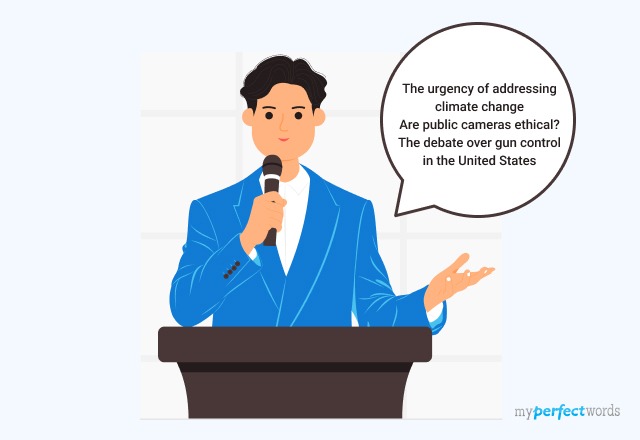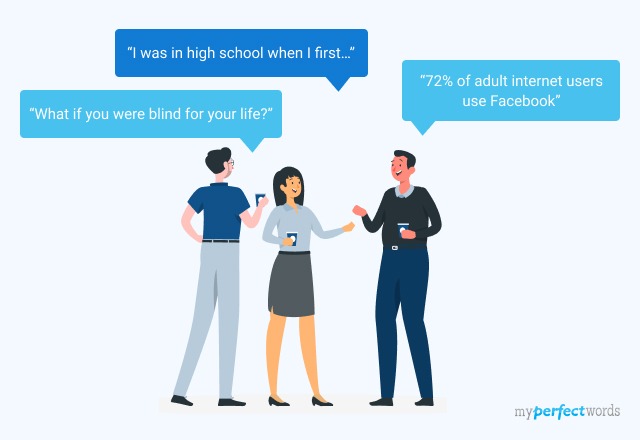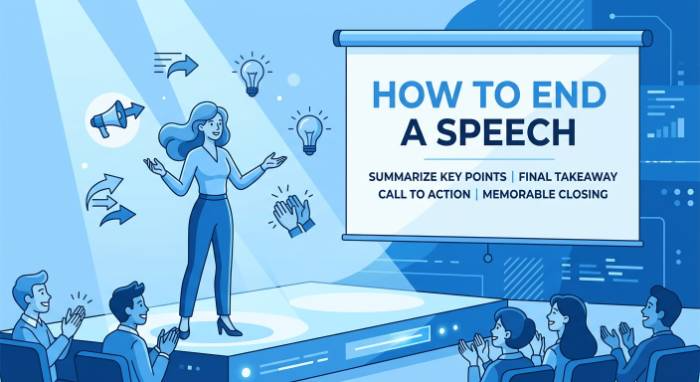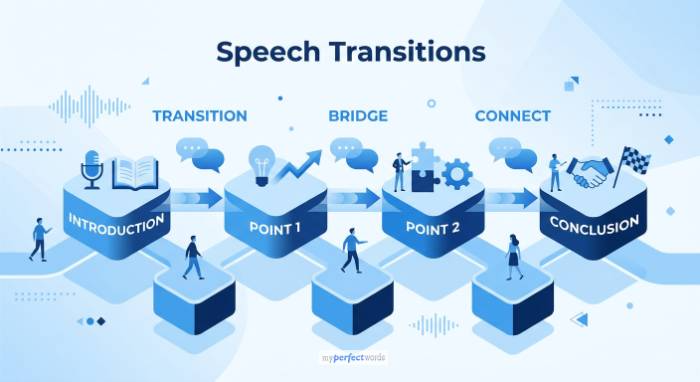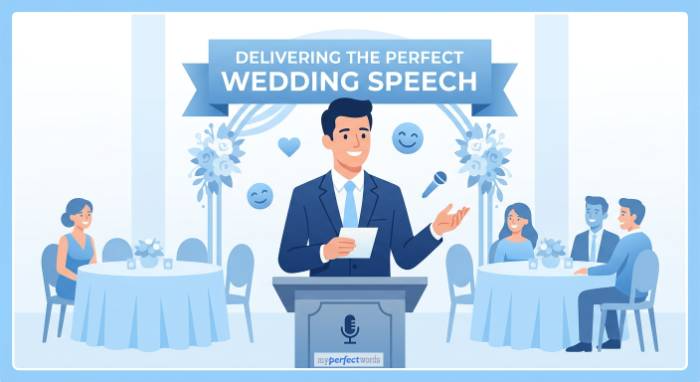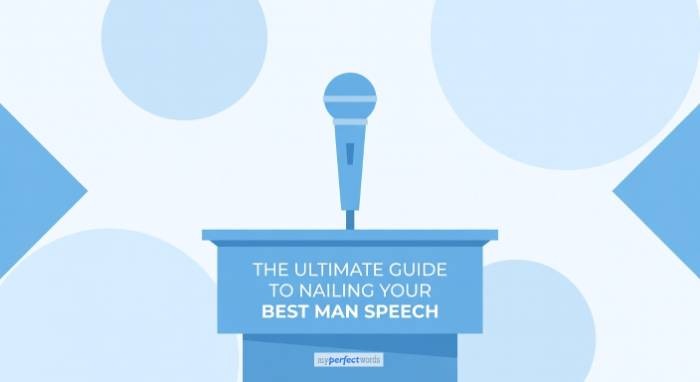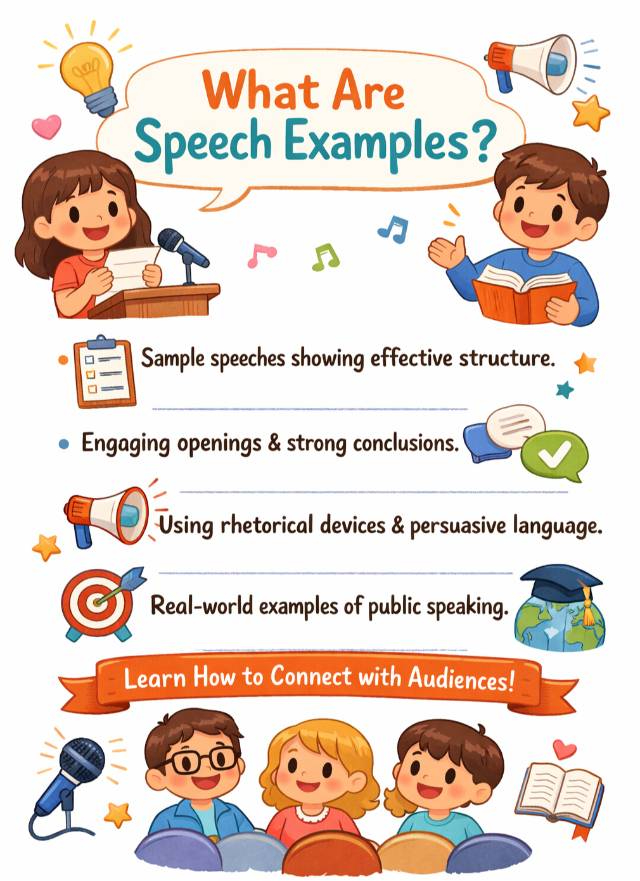
3 Complete Speech Examples
Talking in front of a bunch of audiences is not as easy as it seems. But, if you have some good content to deliver or share with the audience, the confidence comes naturally.
Before you start writing your speech, it is a good idea that you go through some good speech samples. The samples will help to learn how to start the speech and put information into a proper structure.
These speech writing samples will help you understand how to craft compelling speeches that resonate with your audience.
Example#1
Ladies and gentlemen, Today, I want to share a simple yet powerful message with you: Believe in yourself. The journey of life is filled with challenges, obstacles, and moments of doubt. But it's in those moments that your belief in yourself can make all the difference. Think about your dreams, your goals, the things that truly matter to you. They are within your reach, but only if you have the unwavering faith that you can achieve them. Remember, some of the most successful people in the world faced countless rejections and failures, but they never gave up. They believed in themselves and their abilities. Every day, when you wake up, tell yourself that you are capable, you are strong, and you are destined for greatness. Don't let fear or self-doubt hold you back. Embrace challenges as opportunities to learn and grow. In the words of Henry Ford, "Whether you think you can, or you think you can't, you're right." So, choose to believe you can, and you'll be amazed at what you can achieve. Your journey begins with self-belief, and the world is waiting to witness your greatness. Keep believing, keep pushing, and success will be yours. |
Example#2
Ladies and gentlemen, today, I have the delightful task of sharing with you the best joke I've ever heard. Laughter is a universal language, a force that unites us all. So, without further ado, here's the joke that never fails to tickle my funny bone. Why did the scarecrow win an award? Because he was outstanding in his field! Isn't that a classic? It's simple, clean, and has that surprise factor that makes a great joke. But what makes a joke truly the best is not just the punchline but the way it brings people together in laughter. Laughter is a fantastic gift we all share. It breaks down barriers, transcends language, and for a moment, it unites us. It's an escape from the mundane, a burst of joy in our daily lives. As we navigate through life's challenges, let's remember the power of humor. Let's find joy in the simple things, share a joke, and bring a smile to someone's face. After all, as the saying goes, "A day without laughter is a day wasted." So, cherish the best jokes you've heard, and spread the gift of laughter wherever you go. Thank you, and here's to laughter and the best jokes that brighten our days! |
Example#3
Here is another example of speech writing class 11:
Good morning, respected teachers and fellow students, Today, I want to talk about something that affects us all the importance of environmental conservation. Our planet is facing serious challenges, and it’s up to us to protect it. Environmental conservation means protecting our natural resources and the environment. This includes keeping our air and water clean, safeguarding wildlife, and using resources responsibly. Why is this important? Our environment gives us everything we need to survive clean air, water, food, and shelter. However, human activities like deforestation, pollution, and overuse of resources are damaging our planet. If we don’t act now, we’ll face severe consequences like climate change, loss of biodiversity, and resource depletion. One major reason to focus on conservation is to fight climate change. Burning fossil fuels releases greenhouse gasses that cause global warming, leading to extreme weather, rising sea levels, and ecosystem disruption. By conserving energy and using renewable sources, we can reduce our carbon footprint and help combat climate change. Protecting wildlife is also crucial. Many species are endangered due to habitat loss, pollution, and illegal hunting. By preserving natural habitats and enforcing protection laws, we can save these species and maintain ecosystem balance. Water conservation is vital too. Freshwater is limited, and with the growing population, the demand is increasing. Simple actions like fixing leaks, using water-efficient appliances, and being mindful of our water use can help conserve this precious resource. As students, we can contribute by reducing, reusing, and recycling materials to minimize waste. Participating in tree planting, clean-up drives, and awareness campaigns can also make a significant impact. Educating ourselves and others about environmental issues and advocating for sustainable practices can lead to positive change. In conclusion, environmental conservation is everyone’s responsibility. By making small changes in our daily lives and encouraging others to do the same, we can protect our planet. Let’s take action now to ensure a healthier, more sustainable world for ourselves and future generations. Thank you. |
Speech writing is a huge part of academic life. These types of writing help enhance the creative writing skills of students.
3-Minute Campaign Speech for Student Body President
Good morning, Riverside High!
I'm Sarah Martinez, and I'm running for student body president. But I'm not here to make promises I can't keep. I'm here to tell you what I've already done and what we can do together.
Last year, when the music program faced budget cuts, I didn't just complain. I organized a fundraiser that brought in $5,000. When the cafeteria changed lunch times and created chaos, I didn't just wait for adults to fix it. I gathered 200 signatures and presented a solution to the principal. The schedule changed within two weeks.
That's what leadership means to me. Not grand speeches. Not popularity contests. Action.
Here's what I'll fight for as your president:
First, mental health support. One in three of us struggles with anxiety or depression. Yet our school has one counselor for 800 students. I'll work with administration to bring in additional mental health resources and create peer support groups where students help students.
Second, real-world learning. How many of you feel prepared for life after high school? I'll push for personal finance classes, college application workshops, and partnerships with local businesses for internship opportunities. School shouldn't just teach us to pass tests. It should prepare us for life.
Third, student voice. Your concerns shouldn't disappear into a suggestion box. I'll hold monthly open forums where you can raise issues directly. I'll create a student advisory board with representatives from every grade, every club, every corner of our school. Your voice will be heard, not just during election season, but every single day.
I know what you're thinking. "Politicians make promises and forget them." I get it. I've been disappointed too. That's why I'm making this commitment: I'll publish a monthly progress report. You'll see exactly what I'm working on, what's been accomplished, and where I've hit roadblocks. Complete transparency. You deserve nothing less.
Some candidates will promise you longer lunch periods, better vending machines, and more fun. Those things are great. But they're not what will change your high school experience.
What will change your experience is having someone who listens, who acts, and who treats this position like the responsibility it is, not just another line on a college application.
I'm not the most popular person running. I'm not the one with the flashiest posters. But I'm the one who will show up every day, work hard, and put your needs first.
This isn't about me. It's about us. It's about the school we want, the education we deserve, and the community we can build together.
On Friday, when you vote, don't vote for who has the most Instagram followers. Vote for who will follow through.
Vote for someone who will listen. Vote for someone who will act. Vote for real change.
Vote Sarah Martinez for student body president.
Thank you.
Checkout our farewell speech blog written for students to make their farewell special.
Downloadable Speech Examples for Students
Below, you will find other downloadable PDF samples.
When it comes to persuasive speech, the sole purpose of the speech becomes more specific. Check one example below:
Informative speeches are intended to inform the audience. These types of speeches are designed to provide a detailed description of the chosen topic. Below we have an example for you.
If you need more informative speeches like this one, browse our informative speech examples.
Entertainment Speech Examples
Entertainment speeches are meant to entertain the audience. These types of speeches are funny, as well as interesting. The given speech samples will help you in writing an entertaining speech.
You can select entertaining speech topics like this one from our comprehensive topic list.
Argumentative Speech Examples
Making a strong argument that is capable of convincing others is always difficult. And, when it comes to making a claim in an argumentative speech, it becomes more difficult.
Check out the argumentative speech sample that demonstrates explicitly how an argumentative speech needs to be written.
Demonstration Speech Examples
The demonstrative speeches are intended to demonstrate or describe the speech topic in depth. You can check our demonstration speech ideas too.
Transform Notes Into a Polished Speech
We organize your ideas into a clear, engaging speech
Turn raw thoughts into refined speech.
Motivational Speech Examples
Motivational speeches are designed to motivate the audience to do something. Read out our motivational speech topics and start your motivational speech writing.
Speech Essay Example
A speech essay is a type of essay that you write before writing a proper speech. It helps in organizing thoughts and information.
Here is a sample of speech essays for you to understand the difference between speech format and speech essay format.
What Makes a Good Speech?
A good speech has a clear purpose, engaging opening, logical structure, concrete examples, appropriate tone for the audience, and a memorable conclusion. It balances preparation with authenticity, information with emotion, and complexity with clarity. The best speeches make audiences think, feel, and remember.
Importance of Using Speech Examples Before Writing Your Own Speech
Provides a clear structure
Speech examples show how to organize introductions, body paragraphs, and conclusions effectively.Demonstrates effective openings
Examples reveal how strong hooks capture audience attention from the very beginning.Clarifies argument development
Sample speeches illustrate how ideas are introduced, supported, and connected logically.Teaches practical use of rhetorical devices
Real speeches demonstrate how repetition, storytelling, and persuasive language work in context.Improves tone and delivery awareness
Examples help writers understand pacing, emphasis, and conversational flow.Reduces writing anxiety
Having a reference makes the writing process less overwhelming and more focused.Highlights common mistakes to avoid
Reviewing examples helps identify weak transitions, vague conclusions, and overused language.Encourages audience-centered thinking
Speech examples show how language and content change depending on the audience and purpose.Saves time during planning
Instead of starting from scratch, writers can model proven techniques.Builds confidence in original writing
Understanding what works allows writers to create speeches that feel natural and effective.
You've now explored 10+ speech examples across every major type. You understand what makes each type effective and how to structure your own speech for maximum impact.
Your Next Steps:
Visit our complete guide on speech writing blogs and start writing your speech just like these examples
Public speaking is a skill that serves you throughout life. Whether you're presenting in class, interviewing for jobs, leading teams, or celebrating at special occasions, the ability to communicate clearly and confidently opens doors.
And for those moments when you require a professionally written speech that truly stands out, remember that our team is here to help. We can rescue you from writer's block and deliver an outstanding speech whenever you need it.
Still Not Sure Where to Start?
Let our experts handle it from research to final draft
- 24/7 customer support
- On-time delivery guarantee
- 3 hour rush available
- unlimited revisions
You get a Turnitin report proving it's 100% original
Get Started Now